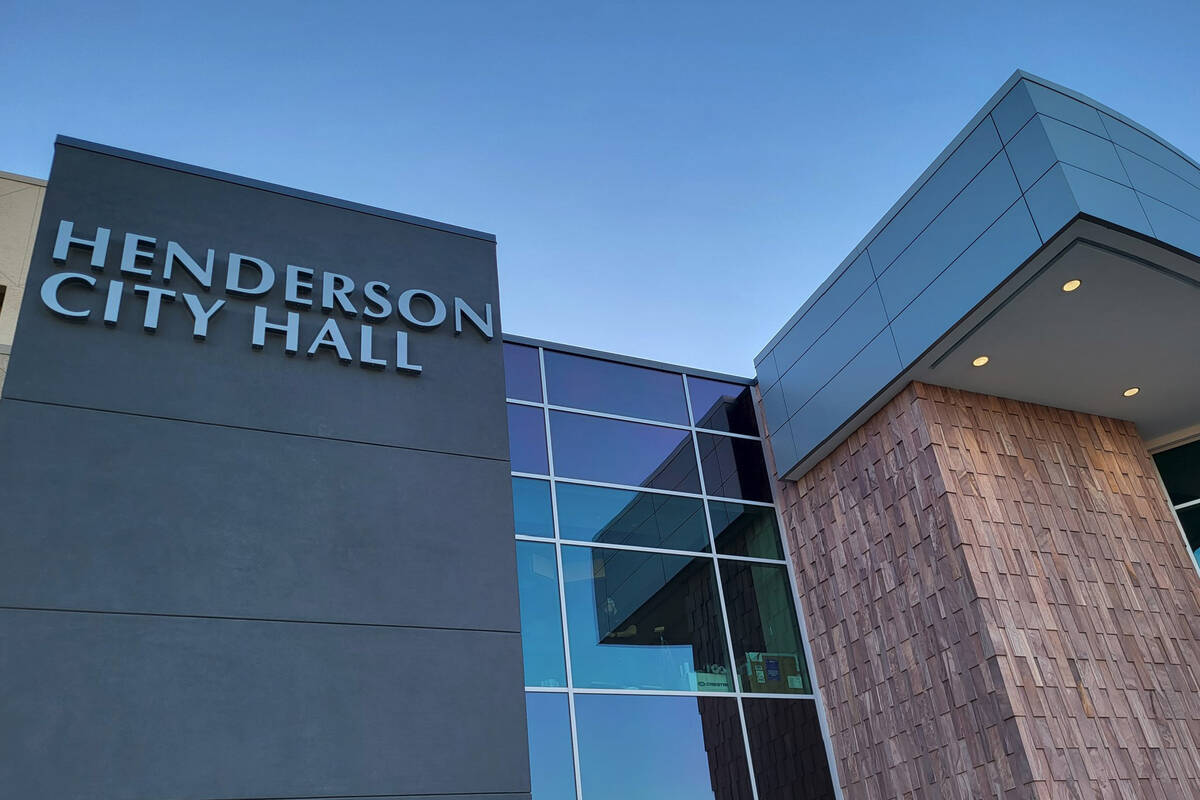Betting on who will win a Henderson City Council race? Follow the money

Want to gauge whether a candidate running for Henderson City Council or mayor will win their race? Just look at how much money they’ve raised.
Over the last decade, 12 of the winners elected out of the 13 elections for mayor and city council raised tens of thousands of dollars more than any of their competitors in campaign contributions, according to campaign finance reports submitted to the Nevada Secretary of State. Some opponents raised hundreds of thousands more.
Councilwoman Carrie Cox was the only exception. Cox won her Ward 3 election in 2022 despite Trish Nash raising over $740,000, the most out of any candidate since 2013. Cox raised just under $300,000.
Otherwise, the four other members of the council secured the most campaign contributions in their races, according to the Nevada Secretary of State:
— Mayor Michelle Romero raised over $146,000 in the 2019 City Council Ward 1 race, while her closest opponent Danny Vella raised just over $7,000. In 2022, Romero raised over $256,000 in the mayoral race, leagues more than her closest opponent, Frank Ficadenti, who raised just under $2,800.
— Dan Shaw was initially appointed to the City Council, but in his 2019 election race, raised just under $50,000. His challenger, Ernest Caalim, raised less than $1,500.
— Dan Stewart, who was also appointed to the council, raised over $40,000 ahead of his election in 2019. His opponent, Curt Easley, didn’t receive any campaign contributions, according to the secretary of state.
— Jim Seebock raised over $200,000 in campaign contributions in 2023’s Ward 1 special election, outpacing his nearest competitor, Melissa Woodbury, who raised just over $120,000.
Romero, Stewart and Shaw could not be reached for comment and Seebock declined comment.
‘Recruited to run’
The biggest donors to each member of the council included development and construction companies, casinos like South Point and Station Casinos, Nevada Restaurant Services, Republic Environmental Technology and public safety unions.
State law caps the amount a person may contribute to a campaign at a maximum of $10,000, with $5,000 during a primary election and $5,000 for a general election.
Stations Casinos contributed to the campaign of every current member of council in more ways than one. Green Valley Ranch gave:
— $10,000 to Shaw’s 2019 campaign
— $5,000 to Stewart and Romero’s 2019 campaigns
— $5,000 to Cox and Romero’s 2022 campaigns
— $1,000 to Seebock’s 2023 campaign
Sunset Station gave $10,000 to Romero’s 2022 mayoral campaign, $10,000 to Cox’s 2022 campaign and $5,000 to Romero, Stewart and Shaw’s 2019 campaigns.
The Henderson Professional Firefighters Association gave Cox’s 2022 campaign $10,000, while the Henderson Police Officers Association gave her $5,000. The Henderson Police Supervisors Association gave Romero’s 2022 mayoral campaign $5,000.
Kenneth Miller, UNLV assistant professor of political science, said this fundraising disparity is common in local elections and that the fundraising shows where the support among the business and political community lies.
“That’s probably because this is the candidate who was being actively recruited by local leadership to run for this office, especially in local elections,” Miller said. “A lot of times people who run and win are people who were recruited to run for these offices, not just people who came out of nowhere.”
Miller said the money from campaign contributions buys communication with voters and the appearance of legitimacy to the public and the media.
But if two competing candidates can raise close to the same amount of money from contributions, then the difference no longer really matters, according to Miller.
But whether or not the amount of money raised directly correlates to impact on policy decisions, political donors still generally get what they want. Miller said wealthy people and organizations who donate to candidates “get listened to more often.”
‘No amount of money that can solve a bad candidate’
But while money raised is an effective indicator of a local election’s outcome, especially in Henderson, Miller pointed out that money does not guarantee a win.
He said campaign funds can sway voters before they form opinions on candidates, but “no amount of money” can convince people to vote for something they do not want.
Trish Nash raised the most out of any Henderson candidate for city council or mayor since 2013 when she raised $741,470 in 2022. But Cox ultimately beat Nash for the Ward 3 seat, securing 51.5 percent of the vote in the general election, despite Cox raising less than half that amount.
Cox attributed her win to voters becoming more educated about their candidates, saying her ward’s residents are “learning who will be accessible, who they can trust” to give them a voice on local issues.
Miller, the UNLV professor, said that no amount of money will ultimately make an enormous change to the electorate.
“The old saying that nothing kills a bad product like good advertising, sort of similarly, there’s no amount of money that can solve a bad candidate,” Miller said.
Contact Mark Credico at mcredico@reviewjournal.com. Follow him on Instagram @writermark2.